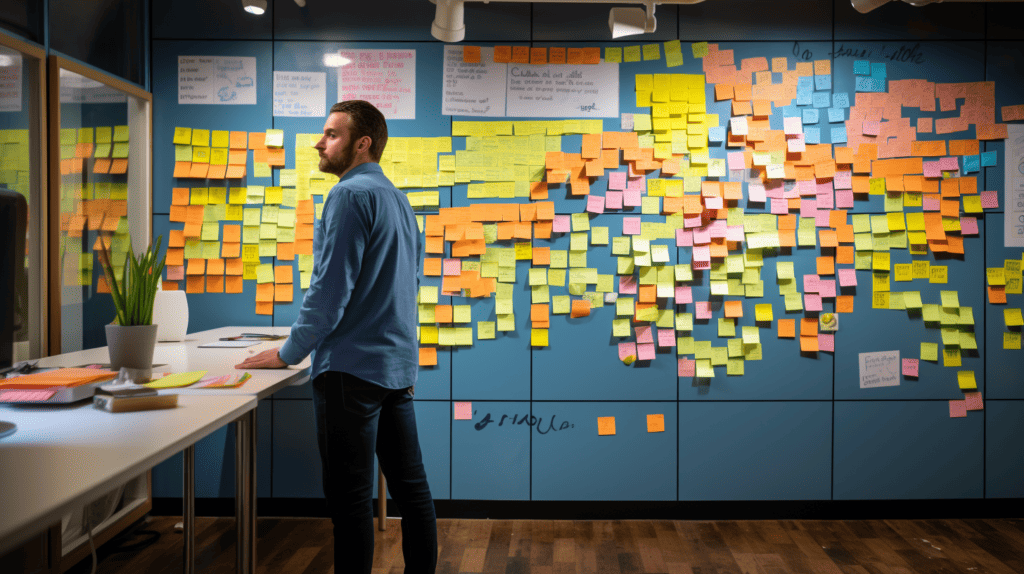Hello there, I’m excited to share with you some powerful tips and techniques for effective office management. From organizing your workspace to managing time, communication, and administrative tasks, there are plenty of strategies that can help you boost productivity and efficiency in the workplace.
Office management is a crucial aspect of any successful business, and implementing the right strategies can lead to increased performance, better employee engagement, and improved bottom-line results. As a professional copywriting journalist, I have seen firsthand the impact of adopting effective office management practices and the benefits they bring to companies of all sizes.
Key Takeaways
- Office management is essential for boosting efficiency and productivity in the workplace.
- Implementing effective strategies for organizing your workspace, managing time, communication, administrative tasks, and leadership can lead to improved performance and employee engagement.
- Adopting feedback and performance evaluation systems, conducting productive meetings, and promoting a positive work culture are essential for successful office management.
Creating an Organized and Efficient Workspace
As someone who has spent years working in various office environments, I know firsthand the impact that a disorganized workspace can have on productivity and efficiency. That’s why I always prioritize creating an organized and efficient workspace, and in this section, I’ll share some tips on how you can do the same.
Declutter Your Workspace
Before you can create an organized workspace, you need to get rid of any unnecessary items. Take a look around your desk and determine what you actually need on a daily basis. Put away or donate any items that are taking up space or causing unnecessary clutter.
Optimize Storage
Once you’ve decluttered, it’s important to optimize your storage solutions. Use drawers, shelves, and cabinets to their fullest potential, and consider using organizers like trays, bins, and dividers to keep everything in its place. You can also utilize wall space by installing shelves or hanging organizers.
Arrange for Workflow Efficiency
The layout of your office can also impact your efficiency. Arrange your workspace with workflow in mind, placing frequently used items within arm’s reach and positioning your computer screen at eye-level. Make sure your workspace is well-lit and comfortable, and consider investing in ergonomic furniture to reduce physical strain.
By decluttering, optimizing storage, and arranging your workspace for workflow efficiency, you’ll be well on your way to creating an organized and efficient workspace that boosts your productivity and success.
Time Management Tips for Improved Productivity
One of the biggest challenges in office management is effective time management. As a professional in this field, I have picked up a few tips that can help you manage your time more efficiently and increase your productivity.
Prioritize Tasks
One of the key time management techniques is to prioritize tasks according to their urgency and importance. Start with the most critical work and avoid getting sidetracked by less important tasks. Create a to-do list and mark each item off as you complete it.
Avoid Distractions
Distractions can be detrimental to your productivity, so it’s essential to avoid them as much as possible. Turn off your phone, close your email, and minimize social media use during work hours. If necessary, find a quiet place to work, preferably away from others to minimize interruptions.
Take Breaks
Many people make the mistake of working for long hours without taking breaks. However, research has shown that taking short breaks every 90 minutes can actually enhance productivity. Take a walk, do some stretching, or engage in relaxation techniques to recharge your energy and stay focused.
Use Time-Blocking
Time-blocking involves dividing your workday into discrete time slots, with a specific task assigned to each slot. This technique can help you stay organized, focused, and on track, and increase your productivity over time.
Set Realistic Goals
Setting realistic goals can help you stay motivated and focused while ensuring that you don’t overcommit. Break larger goals into smaller, achievable steps, and track your progress regularly. Celebrate your successes and learn from your failures to improve your time management skills over time.
By implementing these time management tips, you can optimize your productivity, reduce stress, and achieve success in your office management role.

Effective Communication Strategies for Smooth Operations
As a professional copywriter journalist, I know the significance of effective communication in office management. Clear communication between team members leads to a better understanding of goals and helps to avoid costly mistakes. Communication is a two-way process that involves active listening, feedback, and mutual respect. In this section, I will provide some tips on how to improve communication skills and foster collaboration among team members.
Improving Communication Skills
Effective communication requires both verbal and non-verbal cues. Verbal communication involves the tone of voice, choice of words, and the message’s clarity. It should be concise and to the point. On the other hand, non-verbal communication involves body language, facial expressions, and eye contact. It’s essential to observe these non-verbal cues to get an idea of what a person feels or thinks.
Another way to improve communication skills is by active listening. Good listening skills help to understand the other person’s perspective, which is crucial in avoiding misunderstandings. When you listen, make sure to give the speaker your full attention and avoid interrupting or being distracted by your phone or computer.
Utilizing Technology Tools for Communication
Technology has made communication more accessible and convenient. Email, instant messaging, and video conferencing are some of the tools that enable effective communication in the office. Choose a communication tool that suits the type of message you want to convey. For example, for a quick question, using instant messaging can be more efficient than sending an email.
Fostering Collaboration Among Team Members
Collaboration enhances productivity and encourages new ideas to emerge. Creating a culture of collaboration requires good leadership and a willingness to share ideas. To foster collaboration, encourage team members to work in teams, share experiences, and define clear roles and responsibilities. It’s also essential to recognize and acknowledge the contributions of team members to encourage them to continue working collaboratively.
Effective communication is essential in optimizing office management. By improving communication skills, utilizing technology, and fostering collaboration, you can enhance teamwork, productivity, and morale in the workplace.

Streamlining Administrative Tasks for Efficiency
Administrative tasks such as paperwork, documentation, and record-keeping can be time-consuming and tedious. However, there are strategies you can implement to streamline these tasks and enhance efficiency in the workplace.
One effective approach is to digitize your documents and records. By using digital solutions such as scanning, cloud storage, and online databases, you can easily access and share information with your team members. This can save time and reduce errors that may occur when relying on manual paperwork.
Another useful strategy is to automate repetitive tasks. For instance, you can set up automatic email reminders for upcoming deadlines or use software to generate reports. This can free up time for you and your team to focus on more important tasks and projects.
Standardizing procedures can also enhance efficiency. By developing clear guidelines for tasks such as filing, data entry, and invoicing, you can reduce confusion and errors. This can also improve communication and collaboration among team members.
By implementing these strategies and utilizing digital solutions, you can streamline administrative tasks and improve efficiency in your workplace. This can also create a more organized and productive work environment, leading to increased job satisfaction and better results for your business.
Enhancing Employee Productivity through Effective Leadership
One of the most important aspects of successful office management is effective leadership. As a leader, it is my responsibility to create a positive work environment where employees feel motivated and empowered to perform at their best.
To enhance employee productivity, I always strive to lead by example. This means setting achievable goals, providing clear guidance, and demonstrating a strong work ethic. I believe that when employees see their leaders working hard and taking pride in their work, they are more likely to follow suit.
Another key aspect of effective leadership is fostering a culture of continuous learning and development. To achieve this, I encourage my team members to pursue professional development opportunities, such as attending conferences or taking online courses. I also make it a point to provide regular feedback and constructive criticism to help my employees identify areas for improvement and grow their skill sets.
In addition, I recognize the importance of promoting a positive work culture. This means creating an environment where team members feel valued and supported, and where everyone is encouraged to collaborate and share ideas. By promoting a culture of teamwork and collaboration, I have seen firsthand how it can lead to increased productivity and a stronger sense of morale among employees.
Finally, I understand the importance of recognizing and rewarding exceptional performance. I make it a priority to acknowledge and celebrate the achievements of my team members, whether through verbal praise or more tangible rewards such as bonuses or promotions. By recognizing outstanding performance, I hope to inspire my employees to continue striving for excellence in their work.

Managing Meetings and Collaboration Effectively
Meetings and collaboration are essential components of a successful workplace, but they can also be time-consuming and unproductive if not managed effectively. As an office manager, it is important to ensure that meetings are conducted efficiently and that collaboration is streamlined to maximize productivity.
Conducting Productive Meetings
To conduct productive meetings, it is essential to set specific goals and agendas in advance. This helps to keep the meeting on track and focused on the necessary topics. During the meeting, it is important to ensure that everyone is actively participating and that any distractions are eliminated.
“The most productive meetings are those where everyone is engaged, contributing to the conversation, and actively listening to others.”
After the meeting, it is important to follow up on any action items or decisions made during the meeting. This helps to ensure that the meeting was productive and that any necessary tasks are completed.
Effective Collaboration Strategies
Collaboration is essential for successful project management and teamwork. To enhance collaboration, it is important to utilize technology tools such as project management software and communication platforms. This helps to streamline communication and create a centralized location to access project information.
It is also important to foster a culture of collaboration by encouraging feedback and open communication among team members. This can be achieved through regular team meetings, brainstorming sessions, and team-building activities.
Conclusion
Effective management of meetings and collaboration is essential for a successful workplace. By setting specific goals and agendas, actively engaging all participants, and utilizing technology tools, meetings can be conducted efficiently. By fostering a culture of collaboration and utilizing technology tools, teamwork and project management can be streamlined to maximize productivity.
Implementing Feedback and Performance Evaluation Systems
Feedback and performance evaluation systems are crucial components of effective office management. Providing constructive feedback and setting performance goals helps employees understand expectations, identify areas for improvement, and track their progress. Creating a culture of continuous improvement can enhance employee engagement and motivation.
When establishing these systems, it is important to develop clear and measurable goals. Set realistic targets that are specific, measurable, achievable, relevant, and time-bound. Use tools such as key performance indicators (KPIs) to track progress and identify areas for improvement.
Additionally, it is essential to provide ongoing feedback to employees throughout the year, not just during annual performance reviews. This helps employees stay on track and make adjustments as needed. Providing regular feedback also makes annual reviews less daunting, as it becomes a summary of year-round feedback rather than a surprise evaluation.
Finally, remember that feedback should be constructive and specific. Avoid blanket statements such as “you need to improve.” Instead, provide clear examples of what needs to be improved and offer solutions for improvement.
Conclusion on Office Management Tips Techniques
Managing an office can be a challenging task, but with the right techniques and strategies in place, it can become a smooth and efficient operation. Throughout this article, I have shared various tips and tricks that can help you improve your office management practices and enhance productivity in the workplace.
Remember that office management is not a one-size-fits-all solution. Each office has unique needs, and it’s essential to tailor your strategies based on these needs. Take the time to assess your office’s current state and identify areas that could benefit from improvement.
Take Action
Implementing new strategies can be intimidating, but taking action is crucial to achieving success. Start small by implementing one or two new tips at a time and then gradually build on them. Set achievable goals, track your progress, and don’t be afraid to make adjustments along the way.
As you begin to see positive changes in your office’s efficiency and productivity, continue to monitor and fine-tune your strategies. And most importantly, communicate the benefits of these improvements to your team. When everyone is on the same page, it’s much easier to work towards a common goal.
In conclusion, by following the tips and techniques discussed in this article, you can master office management and take your office’s productivity to the next level.
FAQ on Office Management Tips Techniques
Q: What are some effective office management strategies?
A: Effective office management strategies include creating an organized and efficient workspace, implementing time management techniques, improving communication strategies, streamlining administrative tasks, enhancing employee productivity through effective leadership, managing meetings and collaboration effectively, and implementing feedback and performance evaluation systems.
Q: How can I create an organized and efficient workspace?
A: To create an organized and efficient workspace, you can declutter your office, optimize storage solutions, and arrange your office layout for better workflow. It is also beneficial to establish systems for organizing documents and supplies and keep your workspace tidy and free from distractions.
Q: What are some time management tips for improved productivity?
A: Time management tips for improved productivity include setting realistic goals, prioritizing tasks, utilizing time management tools, avoiding time-wasting activities and distractions, and effectively managing your schedule and deadlines.
Q: How can I improve communication strategies in the office?
A: To improve communication strategies in the office, you can focus on improving your communication skills, fostering collaboration among team members, utilizing technology tools for efficient communication, and promoting open and transparent communication channels.
Q: How can I streamline administrative tasks for efficiency?
A: To streamline administrative tasks for efficiency, you can implement digital solutions for paperwork and documentation, automate repetitive tasks, standardize processes, and utilize efficient record-keeping systems.
Q: What is the role of effective leadership in office management?
A: Effective leadership plays a crucial role in office management as it motivates and empowers employees, fosters a positive work culture, promotes continuous professional development, and ensures smooth operations and high productivity.
Q: How can I conduct productive and efficient meetings?
A: To conduct productive and efficient meetings, you can set clear agendas, facilitate active participation, assign action items and follow up on them, and utilize effective collaboration strategies to enhance teamwork and project management.
Q: Why is feedback and performance evaluation important in office management?
A: Feedback and performance evaluation systems are important in office management as they provide constructive feedback, set performance goals, and create a culture of continuous improvement, leading to enhanced employee performance and overall organizational success.





Leave a Reply